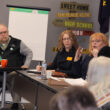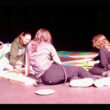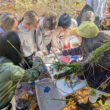Hurricane Katrina has definitely gotten our attention.
One of the most savage storms to hit the United States, it has made many of us painfully aware of the geography of the lower Mississippi.
That hurricane was frightening. But what was more frightening was the aftermath.
After the 150 mph winds and torrential rains swept over New Orleans and the Gulf Coast, doing inestimable damage to those areas, the real horror began.
First, levees that protected New Orleans, much of which is below sea level, broke and a wave of water washed over New Orleans, basically wiping out most of what the hurricane left.
Then the real trouble began ? people trouble.
Residents of some of the poorer sections, in particular, began looting, robbing, raping and shooting at would-be rescuers who were descending upon the city to try to evacuate them.
What a mess. What happened?
Basically, what happened was that a lot of long-overlooked problems came to a head at once.
Experts had warned for years that the levees around New Orleans would be insufficient to protect the city against anything greater than a Category 3 storm. Katrina was way beyond that.. Problem was, the levees were maintained by boards that, we outsiders are learning, were corrupt and built on the same kind of patronage system that led to the other major post-flood problem.
Many of the people who lived in those squalid ghettos weren?t necessarily criminals or thugs, but they were wards of a welfare state that has existed for decades in New Orleans. They are poor people who have been getting handouts from the government for years and have gotten used to it. Speaking generally, they haven?t had to take initiative, stand on their own two feet, and overcome life?s challenges as others do. And when the Big One hit, they didn?t know how to take initiative to solve their basic need: survival .
Consequently, the ones who were thugs seized the opportunity to prey on their weaker brethren. And many of the other flood victims, who had never been forced to take any kind of action to improve their lot in life, were unable to do so in their hour of need.
That?s why we saw the disgusting news reports of people who could do nothing but complain about how bad life was ? the life that they still had, thanks to money, supplies and volunteers who poured into the area. It was heart-breaking to see the physical destruction, but it was even more saddening to see what a moral wasteland was uncovered by this flood.
A local minister observed the other day that if these people had been taught the Ten Commandments, the basic Judeo-Christian moral code once strong in our country, but which has fallen into disfavor among many in power today, would they have been behaving the way we saw on TV?
But enough of pointing the finger. What can we here in Sweet Home learn from Katrina?
There are two basic lessons that stand out from this.
Lesson One: Be Prepared. Down in earthquake country, in California, residents are constantly reminded by local officials to keep a kit of supplies (bottled water, flashlights, a battery-powered radio, a wrench to turn off the gas, medications for basic injuries and illnesses, non-perishable food, toilet paper and pet food) good for a week because if the Big One hit there, it could be days before anyone got any help. After every earthquake, it turns out that many people have ignored those frequent reminders.
So what could happen here? Maybe not an earthquake, but how about the snowstorm of the century? Extended loss of power? A flood? A fire? A volcano, even?
If one of these crises happened here, it might be days for help to arrive. Out here on the eastern end of Linn County, we?d probably be on our own for quite a while.
Lots of things can happen. The question is are we ready to stand up and take action now, and when something does happen, to make sure we do all we can to protect ourselves and our neighbors?
And that brings us to Lesson Two, which is much more challenging: Learn to Behave.
Sweet Home is to be commended for its volunteerism and its residents? efforts to help those in need ? whether it be staging a rock concert to raise funds for a sick man (as we report on page 6 of today?s paper) or contributing money for a helmet to help a baby with a misshapen head or holding a car wash for someone whose business has burnt down. Many people here care.
Given that, could any of the moral degradation that we saw in New Orleans happen here? That?s a question we all need to ask. Where are our values? Where are the values of those around us?
Are our children learning to stand up and be responsible, to respect themselves and others?
We need to ask those questions and if we don?t like the answer, especially after what we?ve seen in Katrina?s wake, now is the time to make changes.




